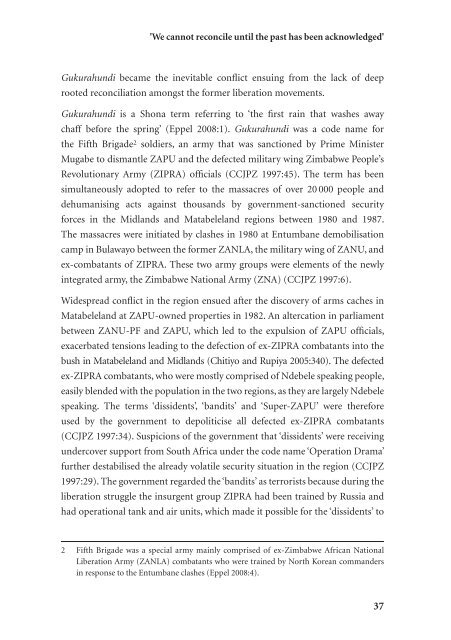ACCORD-ajcr-2015-1
ACCORD-ajcr-2015-1
ACCORD-ajcr-2015-1
- No tags were found...
You also want an ePaper? Increase the reach of your titles
YUMPU automatically turns print PDFs into web optimized ePapers that Google loves.
'We cannot reconcile until the past has been acknowledged'<br />
Gukurahundi became the inevitable conflict ensuing from the lack of deep<br />
rooted reconciliation amongst the former liberation movements.<br />
Gukurahundi is a Shona term referring to ‘the first rain that washes away<br />
chaff before the spring’ (Eppel 2008:1). Gukurahundi was a code name for<br />
the Fifth Brigade 2 soldiers, an army that was sanctioned by Prime Minister<br />
Mugabe to dismantle ZAPU and the defected military wing Zimbabwe People’s<br />
Revolutionary Army (ZIPRA) officials (CCJPZ 1997:45). The term has been<br />
simultaneously adopted to refer to the massacres of over 20 000 people and<br />
dehumanising acts against thousands by government-sanctioned security<br />
forces in the Midlands and Matabeleland regions between 1980 and 1987.<br />
The massacres were initiated by clashes in 1980 at Entumbane demobilisation<br />
camp in Bulawayo between the former ZANLA, the military wing of ZANU, and<br />
ex-combatants of ZIPRA. These two army groups were elements of the newly<br />
integrated army, the Zimbabwe National Army (ZNA) (CCJPZ 1997:6).<br />
Widespread conflict in the region ensued after the discovery of arms caches in<br />
Matabeleland at ZAPU-owned properties in 1982. An altercation in parliament<br />
between ZANU-PF and ZAPU, which led to the expulsion of ZAPU officials,<br />
exacerbated tensions leading to the defection of ex-ZIPRA combatants into the<br />
bush in Matabeleland and Midlands (Chitiyo and Rupiya 2005:340). The defected<br />
ex-ZIPRA combatants, who were mostly comprised of Ndebele speaking people,<br />
easily blended with the population in the two regions, as they are largely Ndebele<br />
speaking. The terms ‘dissidents’, ‘bandits’ and ‘Super-ZAPU’ were therefore<br />
used by the government to depoliticise all defected ex-ZIPRA combatants<br />
(CCJPZ 1997:34). Suspicions of the government that ‘dissidents’ were receiving<br />
undercover support from South Africa under the code name ‘Operation Drama’<br />
further destabilised the already volatile security situation in the region (CCJPZ<br />
1997:29). The government regarded the ‘bandits’ as terrorists because during the<br />
liberation struggle the insurgent group ZIPRA had been trained by Russia and<br />
had operational tank and air units, which made it possible for the ‘dissidents’ to<br />
2 Fifth Brigade was a special army mainly comprised of ex-Zimbabwe African National<br />
Liberation Army (ZANLA) combatants who were trained by North Korean commanders<br />
in response to the Entumbane clashes (Eppel 2008:4).<br />
37


